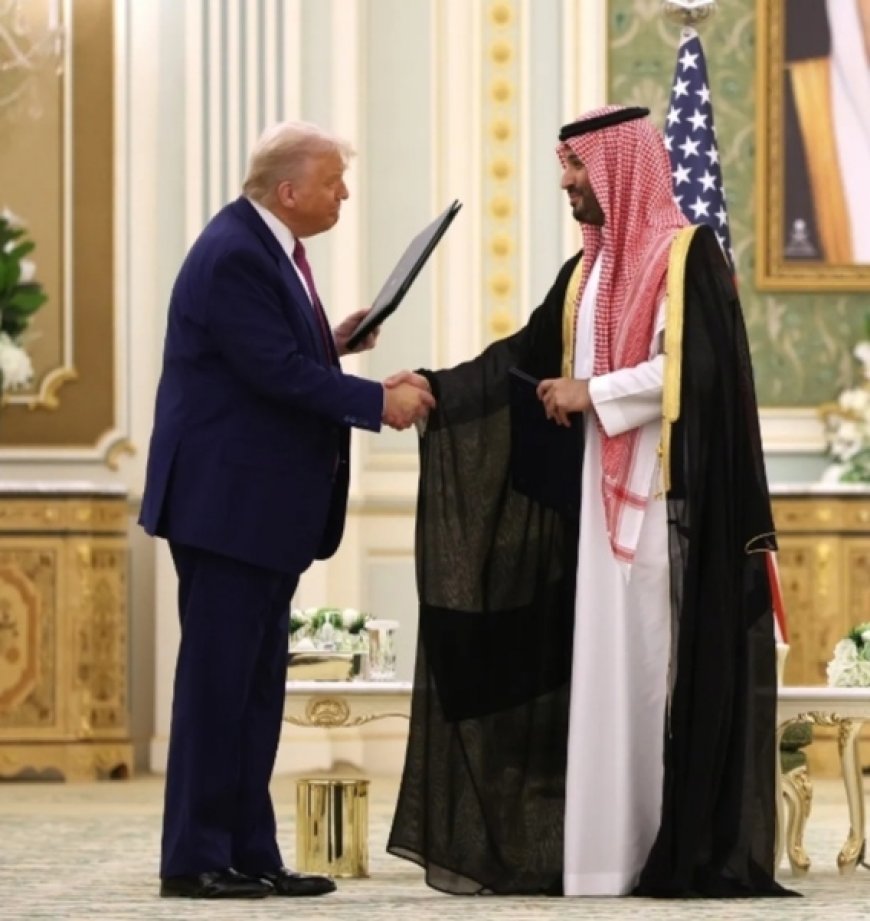Historic Agreement Between the United States and Saudi Arabia: Trump and Mohammed bin Salman Sign Major Bilateral Pacts in Riyadh
Donald Trump and Mohammed bin Salman lead a historic ceremony in Riyadh, signing multiple agreements on defense, energy, health, and space cooperation. Discover the full details and geopolitical impact of this bilateral meeting.

In a highly symbolic and diplomatically significant event, United States President Donald J. Trump and Saudi Crown Prince Mohammed bin Salman signed a series of strategic agreements in Riyadh, solidifying one of the most influential alliances on the global stage. The solemn and formal ceremony not only highlighted the historic ties between both nations but also showcased their shared vision for strengthening cooperation in defense, energy, health, mining, and space exploration.
This meeting marks a milestone in US-Saudi relations as both sides aim to forge a powerful alliance capable of tackling regional challenges, boosting global energy security, and fostering joint technological development.
A Geopolitical Encounter with Global Implications
The signing ceremony was held under the auspices of Saudi authorities, with ministers and senior officials from both governments present. From the outset, both parties made their message clear: the United States and Saudi Arabia remain strategic allies during a period of Middle Eastern tension and shifting global alliances.
President Trump emphasized the importance of maintaining a robust relationship with Saudi Arabia, a crucial partner for Washington in matters of regional security and energy, particularly amid tensions with Iran and strategic moves by China and Russia in the region.
Mohammed bin Salman, in turn, highlighted the long-standing cooperation between both countries and their mutual commitment to advancing new areas of collaboration.
The Signed Agreements: Energy, Defense, and Beyond
Energy Cooperation
One of the most significant agreements was a memorandum of understanding between both nations’ energy ministries. This pact establishes mechanisms for knowledge exchange, joint technology initiatives, and collaborative energy resource projects, with an emphasis on diversification and sustainability.
Defense Alliance
The Saudi Ministry of Defense and the US Department of Defense signed a memorandum aimed at modernizing Saudi Arabia’s armed forces. This includes technology transfer, military training, defense systems maintenance, and strategic arms acquisitions. This agreement cements Saudi Arabia as a primary buyer of US weaponry and solidifies America as its preferred defense partner.
Health and Medical Sciences Collaboration
Another crucial agreement was signed between the Saudi National Institute for Health Research and the US National Institute of Allergy and Infectious Diseases. This memorandum will enable joint research on infectious diseases, a key issue following the global pandemic experience.
Space Exploration
Both nations also formalized a partnership between the Saudi Space Commission and NASA, focusing on joint weather-related space missions and exploration programs. Saudi Arabia is set to participate in US-led space initiatives, including the Cubesat mission.
Mining, Education, and Justice Agreements
The countries’ respective mining ministers signed a deal to promote cooperation in the exploration and development of strategic minerals. Additional agreements included academic exchange programs and judicial cooperation, notably a memorandum of understanding between justice ministries and prosecutors’ offices from both nations.
Geopolitical and Economic Impact
This comprehensive package of agreements represents a decisive step in reinforcing both nations’ influence in the Middle East and beyond. For the United States, it ensures energy stability, secures markets for its defense industry, and expands its presence in a geopolitically vital region.
For Saudi Arabia, these alliances are key to achieving its ambitious Vision 2030 plan, aimed at reducing oil dependency, diversifying its economy, and modernizing governmental and military structures.
Regionally, this alignment strengthens the pro-American bloc as a counterbalance to Iran and Russia’s growing influence in the Middle East.
International Reactions
The global community closely watched the announcement of these agreements. Israel welcomed the development, viewing it as a strategic balancing act in the region. Iran, however, expressed concern over the Saudi military buildup and direct cooperation with the United States.
Human rights organizations also voiced apprehensions regarding the defense deals, citing previous allegations about the use of weaponry in conflicts like Yemen.
The Riyadh signing ceremony was not merely a protocolary act but a tangible demonstration of the geopolitical weight carried by the US-Saudi alliance. With agreements spanning from energy to space, including defense and health, both nations sent a clear message to the world: their strategic partnership is more alive and diversified than ever.
This historic meeting not only strengthens bilateral relations but also reshapes the power dynamics of the Middle East and confirms both countries as indispensable players on the international stage.
What's Your Reaction?
 Like
0
Like
0
 Dislike
0
Dislike
0
 Love
0
Love
0
 Funny
0
Funny
0
 Angry
0
Angry
0
 Sad
0
Sad
0
 Wow
0
Wow
0































